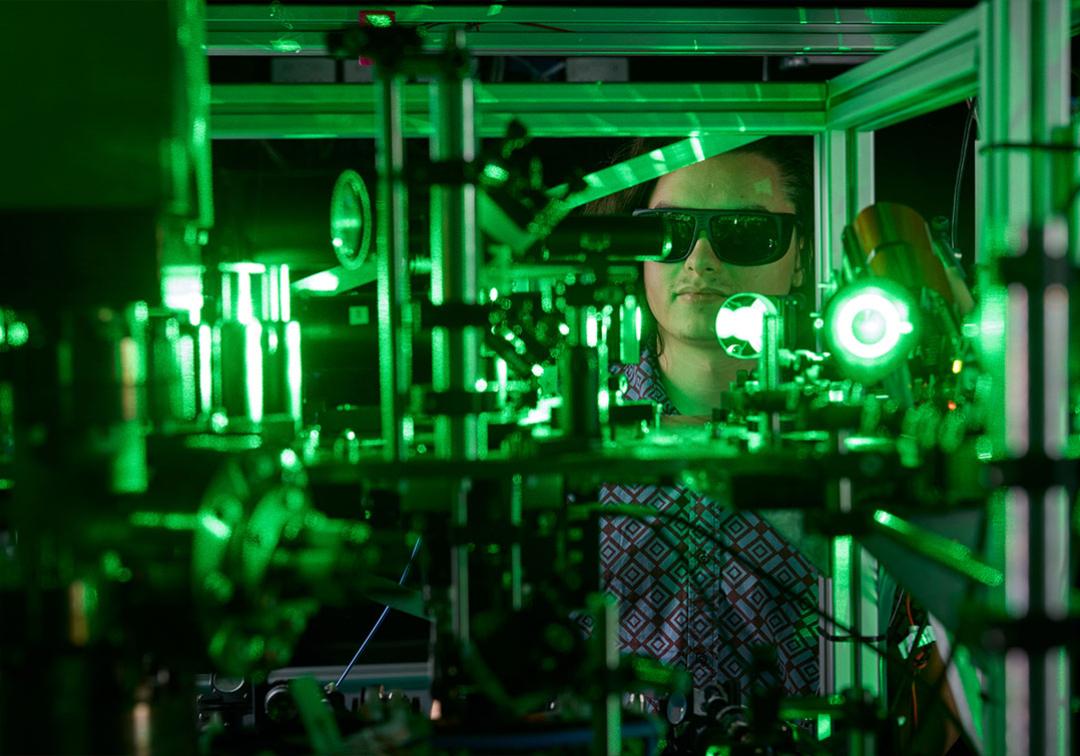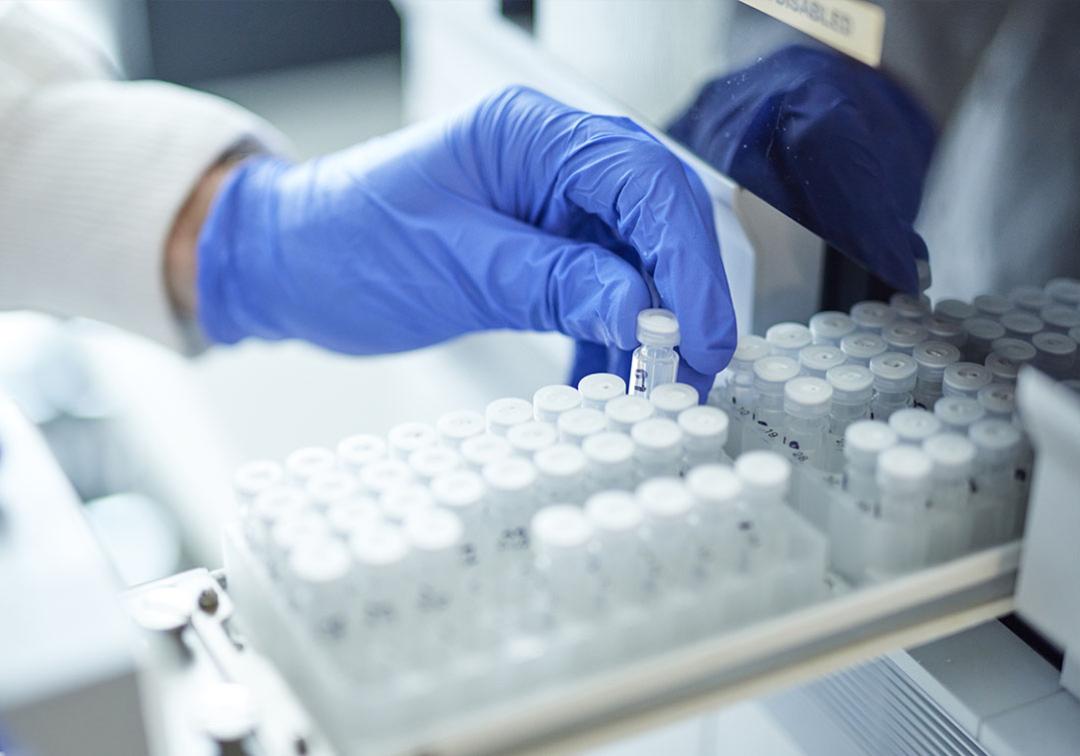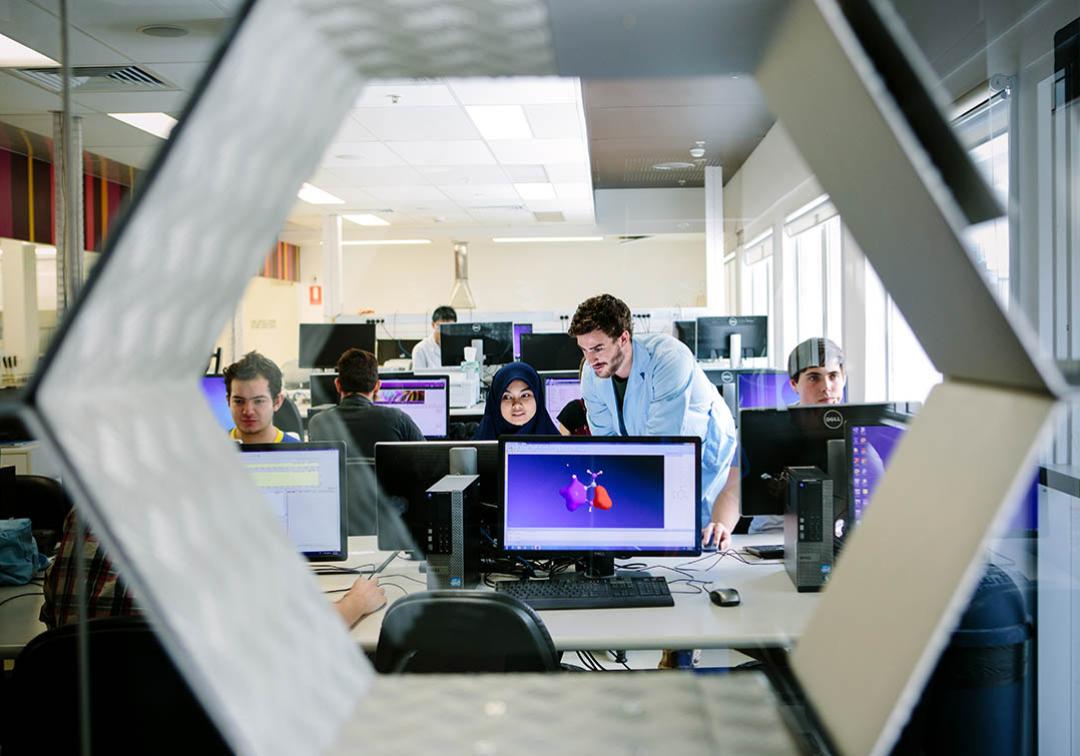
Bachelors of Engineering (Honours) / Biotechnology
Overview
Prepare for the future with a program at the forefront of innovation.
This dual degree combines the practical and theoretical requirements of a professional engineering qualification with the exciting new commercialisation aspects of the growing biotechnology industry.
You'll gain advanced skills in established and emerging engineering disciplines and combine life sciences theory, specialised practical training and entrepreneurial thinking.
UQ's respected Bachelor of Engineering (Honours) program is one of the most comprehensive in Australia for design, technology and innovation. Within this program you can specialise in chemical engineering.
In the Bachelor of Biotechnology, you’ll develop the skills and knowledge needed to translate innovative scientific ideas into commercially viable solutions.
Deepen your understanding of the key issues within biotechnology such as intellectual property, regulatory compliance, quality assurance and quality control. Learn to apply quality management systems in biotechnology so that products and technologies are safe and reproducible.
You’ll also learn how to assess the market potential and financial viability of new products or technical services such as vaccines, diagnostics, biopharmaceutical drugs, transgenic plants or innovations in stem cell therapy.
With a dual qualification in engineering and biotechnology, you'll be equipped for a wide variety of career opportunities in Australia’s thriving life sciences sector where you can contribute to pioneering new frontiers in health, agriculture, science, engineering, and beyond.
Program highlights
- Learn from the best in courses integrating technology with active learning, so you get the knowledge and practical skills to thrive in a constantly changing world.
- Acquire engineering qualifications that set you apart in the job market, prove your leadership material and provide a pathway to future research or learning.
- Gain advanced knowledge of how biotechnology uses cellular and biomolecular processes to develop new technologies and products that can change people's lives.
- Receive hands-on experience in laboratories and industry settings through practical placements and internships so you're career ready come graduation.
Majors
Tailor your studies to suit your goals. This program offers these options:
- Agricultural Biotechnology
- Chemical and Nano Biotechnology
- Chemical Engineering
- Medical Biotechnology
How you'll learn
Your learning experiences are designed to best suit the learning outcomes of the courses you choose.
- Lectures
- Tutorials
- Research experience
- Laboratory work
- Workshops
What you'll study
At UQ, degrees are called 'programs' and subjects are called 'courses'.
Career possibilities
Our programs prepare you for your first job and beyond. Depending on which major you choose, here are some of the careers you could be on your way to:
- Bioprocess scientist
- Product support specialist
- Field application scientist
- Biopharmaceutical scientist
- Bioprocess development engineer
- Chemical engineer
- Process engineer
- Service engineer
- Technical manager
- Biotechnologist
Graduate salary
Engineering (undergraduate)
compared.edu.au
Graduate salary
Science and mathematics (undergraduate)
compared.edu.au
Program accreditation
The Bachelors of Engineering (Honours) / Biotechnology is accredited by:
- Engineers Australia
Events
See all events
1 May - 22 May
UQ's Sustainable Energy programs, Q&A webinars
Stories
See all stories
Study tips
3 pathways to engineering and computing at UQ
Stories
See all stories
UQ people
Meet the expert: exploring computer science with Dr Paul Vrbik

Uni life
What’s it like to study data, analytics and cyber security as a postgraduate?
Entry requirements
Prerequisites
Studying Specialist Mathematics (Units 3 & 4, C) and both Chemistry and Physics is recommended as students will have increased flexibility in their studies.
Students without Specialist Mathematics (or equivalent) may be required to undertake preparatory courses beyond the 80 units for the program and may not be able to complete the program in the minimum time frame without overloading or undertaking summer study.
Prerequisites
Studying Specialist Mathematics (Units 3 & 4, C) and both Chemistry and Physics is recommended as students will have increased flexibility in their studies.
Students without Specialist Mathematics (or equivalent) may be required to undertake preparatory courses beyond the 80 units for the program and may not be able to complete the program in the minimum time frame without overloading or undertaking summer study.
Minimum entry score
Check the minimum entry scores for the individual programs. You must meet the higher score.
Entry score threshold
| ATAR / Rank | IB |
|---|---|
| 84 | 30.5 |
These are the lowest adjusted scores we made an offer to in Semester 1, 2024. Entry scores are based on the most recent Semester 1 intake and are updated in April each year. Meeting the entry score threshold doesn't guarantee admission.
Guarantee your place at UQ: If you meet our guaranteed minimum ATAR you could secure an offer for your preferred program.
English language requirements
IELTS overall 6.5; reading 6; writing 6; speaking 6; listening 6. For other English Language Proficiency Tests and Scores approved for UQ
TOEFL iBT (including Paper Edition) - Overall 87, listening 19, reading 19, writing 21 and speaking 19.
PTE Academic - Overall Score of 64 and 60 in all sub bands.
BE - A minimum overall grade of 4 plus a minimum grade of C in all macro skills.
CES - Overall 176 and 169 in all sub bands.
OET is not accepted.
There are other ways to meet the English language requirements. For some programs, additional conditions apply.
Inherent requirements
To complete this degree, you have to meet its inherent requirements by demonstrating essential skills and attributes. Read the inherent requirements before you apply.
Student visas
International students who are accepted into full-time study in the Bachelors of Engineering (Honours) / Biotechnology are eligible to apply for an Australian student visa (subclass 500).
There are a number of requirements you must satisfy before a visa is granted, including the Genuine Student (GS) requirement.
Entry score range
This table shows the range of entry scores for recent secondary students offered a place in the BEngineering(H)/BBiotechnology for Semester 1, 2024
| Without adjustments | With adjustments | |
|---|---|---|
| Highest | 99.1 | 99.95 |
| Median | 94.3 | 96.15 |
| Lowest | 82.75 | 84.55 |
Need help meeting the entry requirements?
Majors
Specialisations
Tailor your studies to suit your goals. This program offers these options:
Drawing on detailed process development, modelling and systems thinking, chemical engineers apply new approaches and big-picture thinking to reduce waste and energy consumption.
In this hands-on specialisation you'll explore topics including energy and mass flows, safety and sustainability, and the possibilities of interconnected systems.
You will benefit from the insights and expertise of world-leading researchers and highly-qualified academic staff. With practical projects, guest lecturers from industry, internships and placements with leading engineering companies, you'll gain the knowledge, skills and industry connections you need to transition from university to the workplace.
Majors
Tailor your studies to suit your goals. This program offers these options:
Study agricultural biotechnology and undertake advanced-level study in areas including plant and food science, biochemistry, plant and animal molecular biology and genetics.
Learn how to genetically engineer crops or livestock animals to enhance nutritional value, reduce susceptibility to disease, improve sustainability and enable them to thrive in hostile environments.
Access world-class research facilities to learn how gene editing, recombinant DNA technology, bioinformatics, artificial intelligence and point-of-care disease diagnostics can address issues such as food security, climate change and sustainability.
Specialising in agricultural biotechnology can open up a vast array of career opportunities within:
- agriculture and food manufacturing (plant breeding, engineering, cropping and horticulture)
- animal health industries (vaccine development)
- genetic improvement and breeding (plant and livestock)
- government bodies, including those associated with quarantine and agriculture
- primary industries or government departments
- agricultural advisory boards.
You'll also be well-placed to continue into a research-based honours or master's degree and establish the foundations for a rewarding career in research.
You'll combine theory and practice to explore how nanotechnology underpins new innovations in modern medicine, technology and renewable energy.
Develop a comprehensive understanding of organic and inorganic chemistry alongside aspects of microbiology, biochemistry and pharmacology.
Gain hands-on experience in gene editing, recombinant DNA technology, bioinformatics and genomics in our world-class laboratories, research and computer facilities.
This major is accredited by the Royal Australian Chemical Institute, ensuring you gain a rigorous understanding of chemistry.
Growing industrial demand for nanotechnology expertise is creating exciting new jobs in a number of industries. You'll be equipped for a wide range of opportunities in biotechnology, materials science, engineering, technology, renewable energy or pharmaceutical industries.
Alternatively, choose to kickstart your career in research by progressing on to an honours or master's degree.
Combine theory and practice to examine the science that underpins how biotechnology drives advances in modern medicine. You'll be taught by educators who are at the frontier of emerging research fields in biotechnology.
Study core courses across medicinal chemistry, chemical biology, pharmacology and genetics, and apply your knowledge and critical thinking skills to laboratory experiments that discover solutions to complex problems.
You'll learn how new diagnostic devices and equipment are developed and used to accurately identify diseases, and examine how genetics underpins personalised medicine leading to treatment tailored for the individual.
Advance your knowledge of how therapies based on small molecules, biologics, stem cells and other technologies are identified, selected and developed through preclinical and clinical testing into market-ready therapeutics.
You'll be equipped to work in the forefront of biomedical science and the biotechnology industry. Alternatively, continue into a Doctor of Medicine (MD) program or kickstart your career in research through an honours or master's degree.
Molecular and microbial biotechnology involves transferring genetic information between human, plant or animal cells, or microscopic organisms to capitalise on existing biological processes to create new products or innovations.
It's an exciting field of science that combines applications from molecular biology, biochemistry, immunology, genetics and microbiology to create products and innovations in areas as diverse as human and animal health, agriculture, food and sustainable energy production, and textiles.
You'll access world-class laboratory, research and computer facilities to gain hands-on experience in gene editing, recombinant DNA technology, bioinformatics and genomics.
Learn real-world insights from educators who are at the frontier of emerging research fields in biotechnology. You'll also get a chance to network and gain practical experience with our extensive network of industry partners.
Specialising in molecular and microbial biotechnology will prepare you for employment opportunities in Australia’s thriving life sciences sector, which includes the biotechnology, pharmaceutical, food, medical and agricultural technology industries.
You'll also be well placed to continue into a research-based honours or master's degree and establish the foundations for a rewarding career in research.
Synthetic biology is transforming how we develop new medicines, enhance human nutrition and create a more sustainable world.
It is a growing field of science that applies engineering design principles to chemistry, bioinformatics and genetics.
These principles allow scientists to create or modify biological processes in living organisms and then develop new innovations across agriculture, health, energy production and environmental management.
Alongside leading biotechnology educators, you will study all aspects of the product development process. You'll be equipped to translate discoveries from the laboratory into new products, technologies or research methodologies implemented across the globe.
Take advantage of opportunities to network and gain practical experience with our extensive network of industry partners.
Specialising in synthetic biology will prepare you for employment opportunities in Australia’s thriving life sciences sector, which includes the biotechnology, pharmaceutical, food, medical and agricultural technology industries.
You will be well placed to continue into an honours or master's degree and establish the foundations for a rewarding career in research.
Specialisations
Tailor your studies to suit your goals. This program offers these options:
Drawing on detailed process development, modelling and systems thinking, chemical engineers apply new approaches and big-picture thinking to reduce waste and energy consumption.
In this hands-on specialisation you'll explore topics including energy and mass flows, safety and sustainability, and the possibilities of interconnected systems.
You will benefit from the insights and expertise of world-leading researchers and highly-qualified academic staff. With practical projects, guest lecturers from industry, internships and placements with leading engineering companies, you'll gain the knowledge, skills and industry connections you need to transition from university to the workplace.
Majors
Tailor your studies to suit your goals. This program offers these options:
Study agricultural biotechnology and undertake advanced-level study in areas including plant and food science, biochemistry, plant and animal molecular biology and genetics.
Learn how to genetically engineer crops or livestock animals to enhance nutritional value, reduce susceptibility to disease, improve sustainability and enable them to thrive in hostile environments.
Access world-class research facilities to learn how gene editing, recombinant DNA technology, bioinformatics, artificial intelligence and point-of-care disease diagnostics can address issues such as food security, climate change and sustainability.
Specialising in agricultural biotechnology can open up a vast array of career opportunities within:
- agriculture and food manufacturing (plant breeding, engineering, cropping and horticulture)
- animal health industries (vaccine development)
- genetic improvement and breeding (plant and livestock)
- government bodies, including those associated with quarantine and agriculture
- primary industries or government departments
- agricultural advisory boards.
You'll also be well-placed to continue into a research-based honours or master's degree and establish the foundations for a rewarding career in research.
You'll combine theory and practice to explore how nanotechnology underpins new innovations in modern medicine, technology and renewable energy.
Develop a comprehensive understanding of organic and inorganic chemistry alongside aspects of microbiology, biochemistry and pharmacology.
Gain hands-on experience in gene editing, recombinant DNA technology, bioinformatics and genomics in our world-class laboratories, research and computer facilities.
This major is accredited by the Royal Australian Chemical Institute, ensuring you gain a rigorous understanding of chemistry.
Growing industrial demand for nanotechnology expertise is creating exciting new jobs in a number of industries. You'll be equipped for a wide range of opportunities in biotechnology, materials science, engineering, technology, renewable energy or pharmaceutical industries.
Alternatively, choose to kickstart your career in research by progressing on to an honours or master's degree.
Combine theory and practice to examine the science that underpins how biotechnology drives advances in modern medicine. You'll be taught by educators who are at the frontier of emerging research fields in biotechnology.
Study core courses across medicinal chemistry, chemical biology, pharmacology and genetics, and apply your knowledge and critical thinking skills to laboratory experiments that discover solutions to complex problems.
You'll learn how new diagnostic devices and equipment are developed and used to accurately identify diseases, and examine how genetics underpins personalised medicine leading to treatment tailored for the individual.
Advance your knowledge of how therapies based on small molecules, biologics, stem cells and other technologies are identified, selected and developed through preclinical and clinical testing into market-ready therapeutics.
You'll be equipped to work in the forefront of biomedical science and the biotechnology industry. Alternatively, continue into a Doctor of Medicine (MD) program or kickstart your career in research through an honours or master's degree.
Molecular and microbial biotechnology involves transferring genetic information between human, plant or animal cells, or microscopic organisms to capitalise on existing biological processes to create new products or innovations.
It's an exciting field of science that combines applications from molecular biology, biochemistry, immunology, genetics and microbiology to create products and innovations in areas as diverse as human and animal health, agriculture, food and sustainable energy production, and textiles.
You'll access world-class laboratory, research and computer facilities to gain hands-on experience in gene editing, recombinant DNA technology, bioinformatics and genomics.
Learn real-world insights from educators who are at the frontier of emerging research fields in biotechnology. You'll also get a chance to network and gain practical experience with our extensive network of industry partners.
Specialising in molecular and microbial biotechnology will prepare you for employment opportunities in Australia’s thriving life sciences sector, which includes the biotechnology, pharmaceutical, food, medical and agricultural technology industries.
You'll also be well placed to continue into a research-based honours or master's degree and establish the foundations for a rewarding career in research.
Synthetic biology is transforming how we develop new medicines, enhance human nutrition and create a more sustainable world.
It is a growing field of science that applies engineering design principles to chemistry, bioinformatics and genetics.
These principles allow scientists to create or modify biological processes in living organisms and then develop new innovations across agriculture, health, energy production and environmental management.
Alongside leading biotechnology educators, you will study all aspects of the product development process. You'll be equipped to translate discoveries from the laboratory into new products, technologies or research methodologies implemented across the globe.
Take advantage of opportunities to network and gain practical experience with our extensive network of industry partners.
Specialising in synthetic biology will prepare you for employment opportunities in Australia’s thriving life sciences sector, which includes the biotechnology, pharmaceutical, food, medical and agricultural technology industries.
You will be well placed to continue into an honours or master's degree and establish the foundations for a rewarding career in research.
Fees and Scholarships
Indicative annual fee
Approximate yearly cost of tuition (16 units). Your fees will vary according to your selected courses and study load. Fees are reviewed each year and may increase.
$7,754
2024
$7,754
2024
Approximate yearly cost of tuition (16 units). Your fees will vary according to your study load. Fees are reviewed each year and may increase.
AUD $50,592
2024
AUD $50,592
2024
Government assistance
Financial aid
As an international student, you might be eligible for financial aid – either from your home country, or from the Australian Government.
HECS-HELP
Domestic places in the Bachelors of Engineering (Honours) / Biotechnology are Commonwealth Supported. This means the cost of your education is shared between you and the Australian Government.
Instead of tuition fees, Commonwealth Supported students pay what are called student contribution amounts.
HECS-HELP is an Australian Government loan scheme to assist eligible students with the cost of their student contribution amounts.
Centrelink support
The Australian Government offers a number of income-support payments to eligible Australian university students.
Scholarships
You may be eligible for more than 100 scholarships, including:
How to apply
Applying online
If your senior schooling is from outside Australia, you can submit your application to UQ. Or, if you prefer, you can use an approved UQ agent in your country.
The program code for the Bachelors of Engineering (Honours) / Biotechnology is 2486.
Find out more about applying for undergraduate study
If your senior schooling is from Australia
Submit your application to the Queensland Tertiary Admissions Centre if you're an international student who is currently studying:
- Australian Year 12 (in Australia or another country), or
- the International Baccalaureate in Australia.
The QTAC code for the Bachelors of Engineering (Honours) / Biotechnology is 717501.
Applying through QTAC
All domestic applications should be submitted to the Queensland Tertiary Admissions Centre (QTAC).
The QTAC code for the Bachelors of Engineering (Honours) / Biotechnology is 717501.
Important dates
If you’re studying Year 12 in Australia, go to the QTAC website to check the closing date for this program.
If you’re applying to UQ, the closing date for this program is:
- To commence study in semester 2 - May 31 of the year of commencement.
- To commence study in semester 1 - November 30 of the previous year.
To learn more about UQ dates, including semester start dates, view the Academic Calendar.
Important dates
To check the closing date for this program, go to the QTAC website.
To learn more about UQ dates, including semester start dates, view the Academic Calendar.
Admissions schemes
Applying to university can be both exciting and daunting, which is why we’ve tried to make the process as simple as we can.
We have several schemes in place to improve your chances of getting a place at UQ.
Pathway options
A rank or score doesn’t determine your potential.
If you're not offered a place in your first-choice program – or if you don't meet the entry requirements – you still have a number of options.
Aboriginal and Torres Strait Islander applicants
For support with applying – or if you have any questions about university life – get in touch with our Aboriginal and Torres Strait Islander Studies Unit.
Explore other programs
Express yourself. And your interest.
They say choosing a degree is hard, which is why we've made it easy. Register your interest and we'll send you everything you need to know about applying to UQ.





